How Do You Know if Youre Good at Writing Poetry
Learning how to write a poem is debatably 1 of the hardest forms of creative writing to master—in that location are so many "rules", but at the aforementioned fourth dimension, no rules at all. It is the ultimate form of individual expression, yet there are creative writing prompts that fit into genres.
Disruptive, right?
Despite the challenge, writing poetry is a very fulfilling creative venue, and we have exactly what y'all're looking for to learn how to smash this art form.
Because poetry is so specific to the artist, knowing how to write a poem in your ain way can be tricky.
Here's how to write a verse form using our fundamentals of poesy:
- Empathise the benefits of writing verse
- Decide which type of poetry to write
- Have proper poem structure
- Include sharp imagery
- Focus on sound in poesy
- Define the verse form'southward meaning
- Have a goal
- Avoid clichés in your poems
- Opt for minimalistic poems
- Refine your poem to perfection
If you lot're ready to learn what information technology takes to write (and then potentially publish a book of) good poetry, nosotros've got the assistance you lot need.
Benefits of Learning How to Write a Poem
Even if you aren't looking to become a full-time poet, or even attempt to publish a single verse form, writing poetry tin can be benign in several ways.
- It strengthens your skills in writing solid imagery. Poetry is a very paradigm-based form of writing, so practicing poetry will amend your imagery in other forms every bit well.
- Poetry is concise and impactful—it uses potent linguistic communication, and no more than words than are necessary. If you have an understanding of how to write a verse form, your prose when writing a novel will get crisper and stronger.
- Poetry helps you to connect with emotions in a tangible way. Other forms of writing have the plot to hibernate behind—with poetry, all you've got are emotions. (Unless it'southward a narrative poem, of grade.)
- You lot tin can become a professional poet and earn a living writing. Even if you lot just want to enjoy poetry for the above reasons, you can also make a total-time income this way. A great way to go started is to apply for a poetry scholarship in add-on to the rest of the tips here.
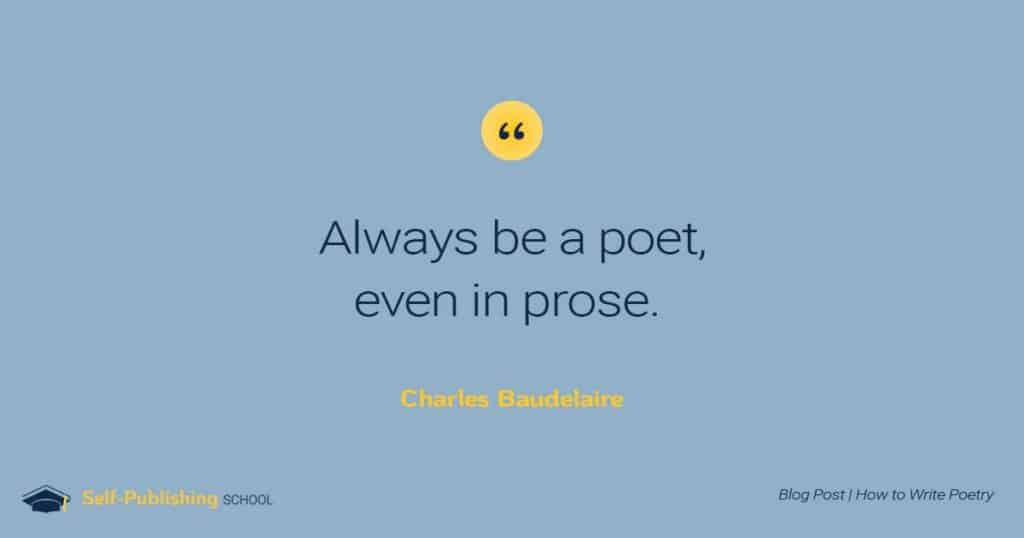
Types of Poetry
Non all types of poetry are the same, and that means learning how to write a poem involves beingness familiar with the different types.
Here are the different types of poetry:
- Narrative – this kind of verse form relies on a story. It tells an issue and there are often a few extra elements, such equally characters, a plot, and a strong narration.
- Lyrical – a lyric poem is similar to a song, and it tends to draw a specific feeling, scene, or state of mind.
You lot may be familiar with these different types of poesy. For example, a lyrical poem is actually a song. Listening to your favorite radio station is just like hearing a collection of your favorite poems being read to you with some background music.
A narrative poem is, as mentioned to a higher place, more like a story told in poetic prose.
Here's a minor example of a part of Edgar Allen Poe'southward famous poem, The Raven:
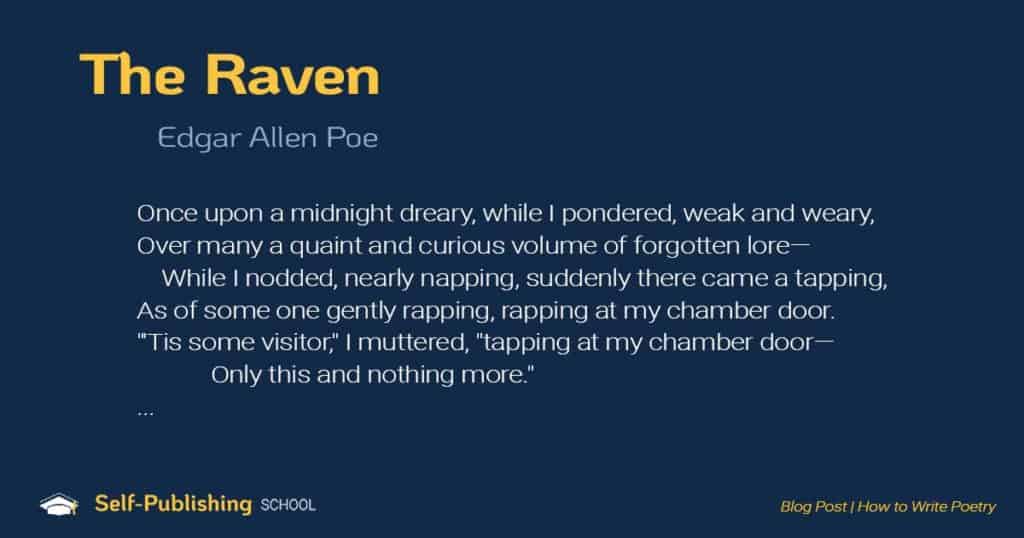
8 Fundamentals for How to Write a Poem
Poetry can ofttimes be subjective. Not every poem volition speak to every person.
That being said, there are different attributes that you should learn if y'all desire to know how to write poetry well regardless.
#ane – Structure of writing a poem
The structure of a poem can refer to many different things, only we're going to hash out some dissimilar forms of poesy, how to use punctuation, and last words.
Form of a Poem
The grade of your verse form is the physical construction. Information technology can have requirements for rhyme, line length, number of lines/stanzas, etc.
Here are different types of poetry forms:
- Sonnet – A short, rhyming poem of xiv lines
- Haiku – A poem of iii lines where the outset is 5 syllables, the middle is seven syllables, and the last is five.
- Acrostic – A poem where the start letter of each line spells a give-and-take that fits with the theme of the verse form or exposes a deeper significant.
- Composition – This is a 5-alive witty poem with the first, 2nd, and fifth lines rhyme as do the other 2 with each other.
- Epic – This blazon of poetry is a lengthy narrative poem celebrating adventures or accomplishments of heroes.
- Couplet – This can be a part of a poem or stand alone as a poem of two lines that rhyme.
- Complimentary verse – This type of verse form doesn't follow any rules and is free written poetry past the author.
The majority of poets, specifically less experienced ones, write what's called complimentary poesy, which is a poem without a class, or with a form the poet has made upwardly for that specific slice.
A poet may make up one's mind to take a certain rhyme scheme or might make their poems syllabic.
With a free verse verse form, you lot can set up any theme or pattern yous wish, or have none at all.
The great affair about poetry is that yous tin even start with a specific verse form form, so cull to modify it in order to make it unique and your ain.
Verse Punctuation
Writing a verse form is difficult because yous never know what the appropriate punctuation is, because it can be unlike from punctuation when writing a book.
There are substantially iii ways to punctuate your verse:
- Grammatically – this means you apply punctuation properly for every grammer rule; if yous removed the lines and stanzas, it would work as a grammatically correct paragraph, and this even includes writing dialogue in your poem.
- Stylistically – this ways you use punctuation to serve the manner you would like the verse form to be read. A comma indicates a brusque break, a period indicates a longer pause, a dash indicates a pause with a connection of thoughts. Using no punctuation at all would lend to a rushed feeling, which you lot may want. Your punctuation choices will depend on your goals when writing a poem.
- A combination. Peradventure you desire to generally follow punctuation rules, but you have a certain line you desire read a certain way. It's totally fine to deviate from standard rules if information technology serves a purpose—you merely need to do whatever yous're doing intentionally. Know the rules before you tin can pause them.
"In poetry, punctuation serves every bit the usher. Information technology sets the beat of a line or a stanza, telling yous where to intermission for breath. Conversely, enjambment —running lines of poetry together past non ending them with punctuation—can be extremely powerful, when used correctly. Information technology keeps the line flowing without a break or a total stop." – Krystal Blaze Dean
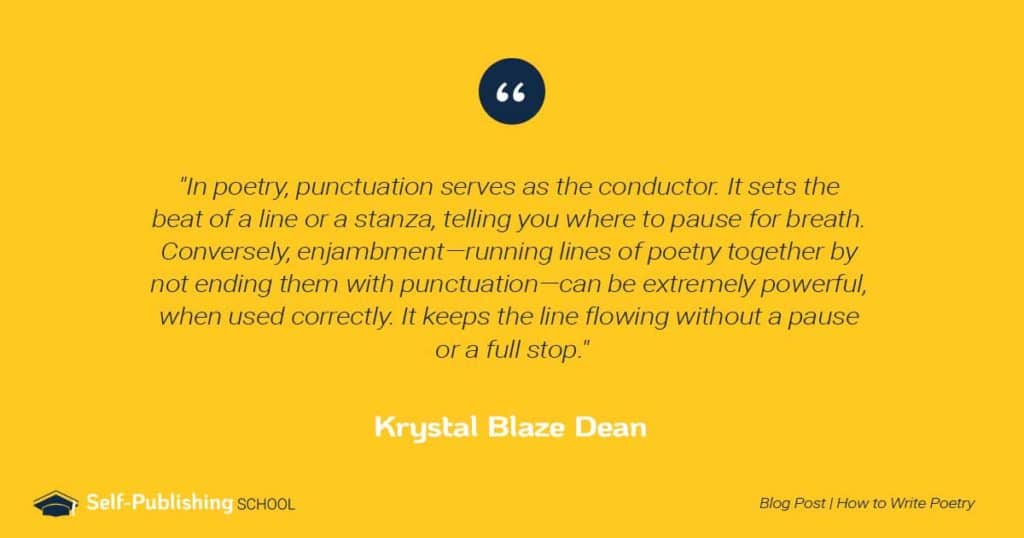
Last words of a poem
The last discussion of a line, the last word of your poem, and the last line of your poem are very important—these are the bits that repeat in your reader'south head and have the nearly emphasis.
Ending with punctuation (dash, flow, comma) versus ending without punctuation will give you a dramatically different read, then consider the effect you'd like to have.
Tip for concluding words : read the verse form out loud a few times to see where you'd like the inflection and emphasis to fall.
#2 – Imagery
Imagery is a literary device that's a tangible description that appeals to one of the five senses.
The more imagery in a poem, the more the reader can connect with information technology.
Tip for imagery : focus on details. Instead of going for the obvious description, really put yourself in that moment or feeling—what details are the most impactful and real?
Here are some examples of imagery:
- Pungent fumes lifted from the floor beneath her.
- Burning light painted the insides of his eyelids red.
- Hair from her ponytail bit at her face, swept into a frenzy by the furious winds.
- Crackling popped in rhythm to the dancing flames.
#3 – Sound
While imagery is for the mind, sound is for the ear. How do your words and lines sound when read out loud?
The most basic sound style is a rhyme, however, you lot should never forcefulness a rhyme!
If you try for exact rhymes on every line, information technology becomes "sing songy," and this is a big, red marker of an amateur. Sticking to a strict rhyme scheme can severely limit your discussion choice and creativity.
Instead of going for exact terminate rhymes, hither are some options to reach that appealing auditory effect of rhyming when writing poems:
- Assonance – the repetition of a vowel sound in non-rhyming, stressed syllables. Assonance gives you the fun sound issue of a rhyme without sounding campy. An example of assonance is: "Hear the mdue eastllow westwardedding beastwardlls" past Edgar Allen Poe.
- Alliteration – the repetition of a consonant at the beginning of words. Specifically hard consonant sounds like T, ST, and CH accept a difficult, staccato effect that a lot of poets like to apply.
- Internal rhymes – words inside of lines rhyme, rather than the end words. Like assonance, you get the upshot of a rhyme without sound like a Dr. Seuss ripoff.
Tip for sound in poetry : Focus on cute, crisp imagery to carry your poem, rather than strictly relying on the sound and construction of it.
#four – Meaning
Structure, imagery, and audio work together to make up the technical excellence of a poem. But if your words are empty of a deeper meaning, what'southward the point in writing a verse form at all?
"Poetry is a class of storytelling. The key to writing is making the audience feel . Give them something to call back and agree onto." – Brookes Washington
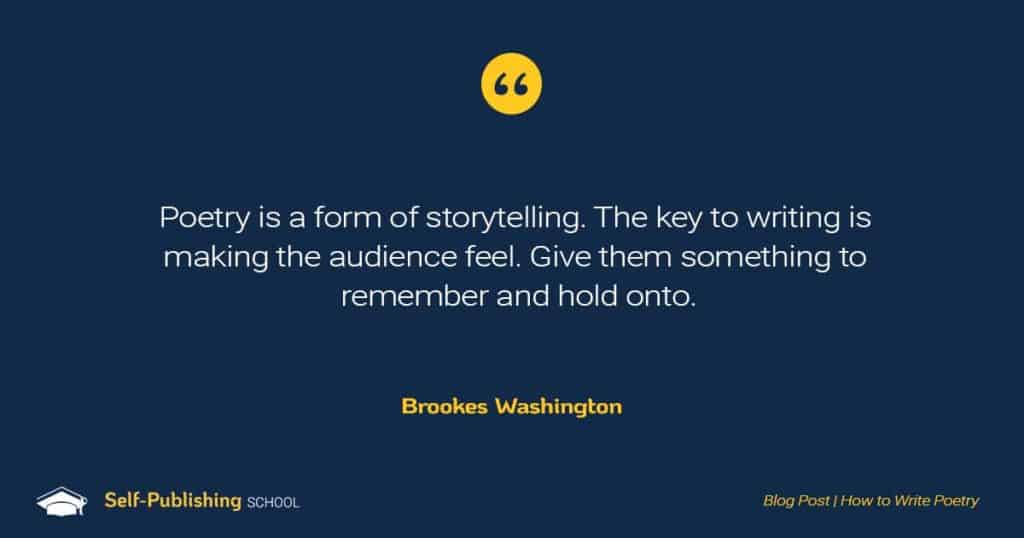
Many new writers latch onto clichés and tired topics (peep that ingemination) for their poems, because they think that'south what they're supposed to practise.
But emulating something someone else has done, or some idea of what you should think a poem should be about, isn't going to requite you a genuine, emotional piece that other people can connect to.
So write the poem that only you tin can write.
Tips for how to write a poem with pregnant:
- Brainstorm poetry topics by looking at your ain experiences. What do you know? When is a fourth dimension you felt very deeply most something? Tin can you put that feeling into words? Tin can you make that feeling an image other people tin run into through your words? That is the poem you lot write.
- You don't need some grand, dramatic emotion to write near—think almost the ordinary things that make united states all homo.
"Nothing always ends poetically. It ends and nosotros plow it into poetry. All that claret was never once beautiful. Information technology was just red." – Kait Rokowski
#5 – Have a goal
Have a goal with writing a verse form—what practise you want your audience to feel?
Are you just writing for fun or for yourself? Poetry is often a very personal form of writing, but that doesn't mean you shouldn't think about your audience at the same time.
If you want to publish your poetry eventually, there are a few things to think about in terms of your goals.
What emotion or moral do you want to convey? What are yous trying to limited?
These are important questions to reply in order to write an impactful and memorable poem.
#6 – Avert cliche phrases when writing poetry
There are many clichés you lot want to avoid when writing poetry.
Naught actually marks an amateur poet like clichés (and forced rhymes, like we mentioned before).
Despite the temptation, avoid cliché phrases. Go line past line and make your linguistic communication as crisp and original as yous can.
If there are pieces in your poem that seem similar yous've read or heard them before, try to reword it in lodge to make it more than original.
#7 – Opt for minimalism
Err on the side of minimalism. Once yous have a draft, cut it back to the bare, raw necessaries.
Every word should be heavy with emotion and meaning, and every word should be absolutely essential.
If your poem seems long-winded to you, imagine what that would be like for your reader. Be gear up to edit your poem to go it downwardly to its best form.
"Poetry is only word math. Every piece has hateful something , and there can't be whatever extraneous bits otherwise it gets confusing. It just becomes a puzzle made out of all the words that make you feel something." – Abigail Giroir
#8 – Refine your poem
The real magic of poesy happens in the revising and refining.
Revise the ever-living heck out of it. To paraphrase an quondam professor of mine: Don't be afraid to sit with information technology. For weeks, months, years—as long as the poem needs.
It's great to have writing goals and timelines, but don't rush a poem earlier you know information technology's ready.
Avert abstractions. An brainchild is a discussion that can only refer to a concept or feeling—it's not a concrete, tangible thing. Some examples of this are freedom, dear, bondage, aggression.
Abstractions brand every person picture something different, so they are weak words, and they will weaken your poem.
Instead of using an abstraction, call up of what imagery you lot tin can use to convey that emotion or concept. Liberty can become chains breaking or birds flying. Honey tin be bringing your spouse coffee in bed, petting a dog, cleaning a gravestone.
Recall of the best images to convey your idea of that brainchild, so every reader can be on the aforementioned folio with y'all.
Don't pigeonhole yourself into a form that will stifle your creativity, use imagery and sound, have a meaning and a purpose for every poem, and revise until your fingers bleed.
Ready to Publish YOUR Book of Poems?
Grab your copy of Published. today and publish your first (or eighth) collection of poems!
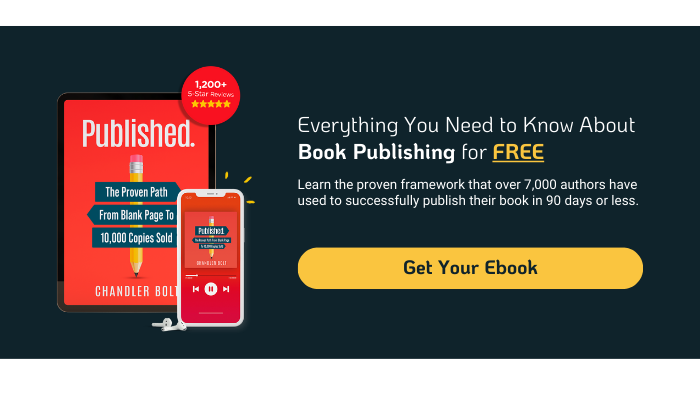
Disclosure: Some of the links above may contain affiliate partnerships, meaning, at no additional cost to yous, Cocky-Publishing School may earn a committee if yous click through to make a purchase.
Source: https://self-publishingschool.com/how-to-write-a-poem/
0 Response to "How Do You Know if Youre Good at Writing Poetry"
Post a Comment